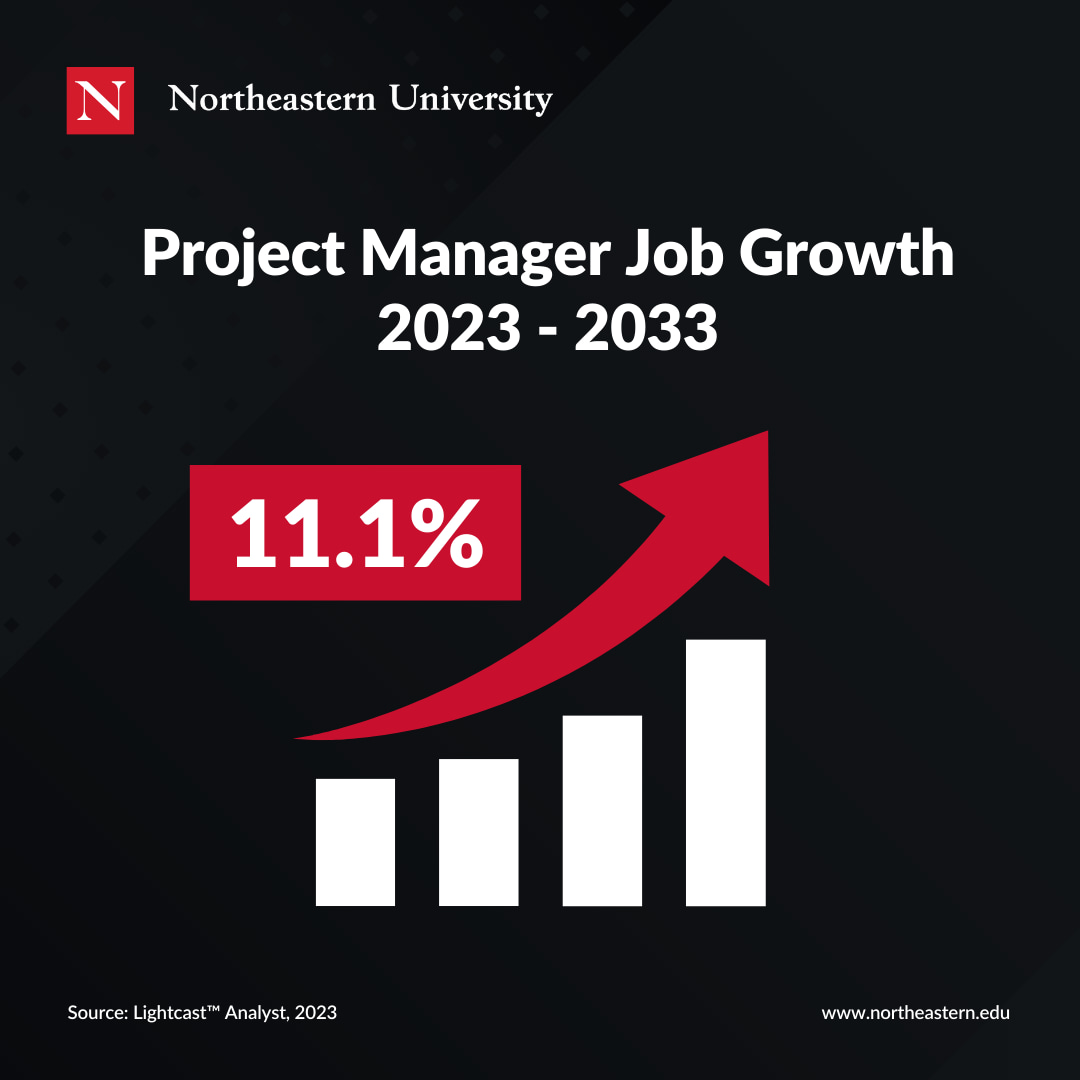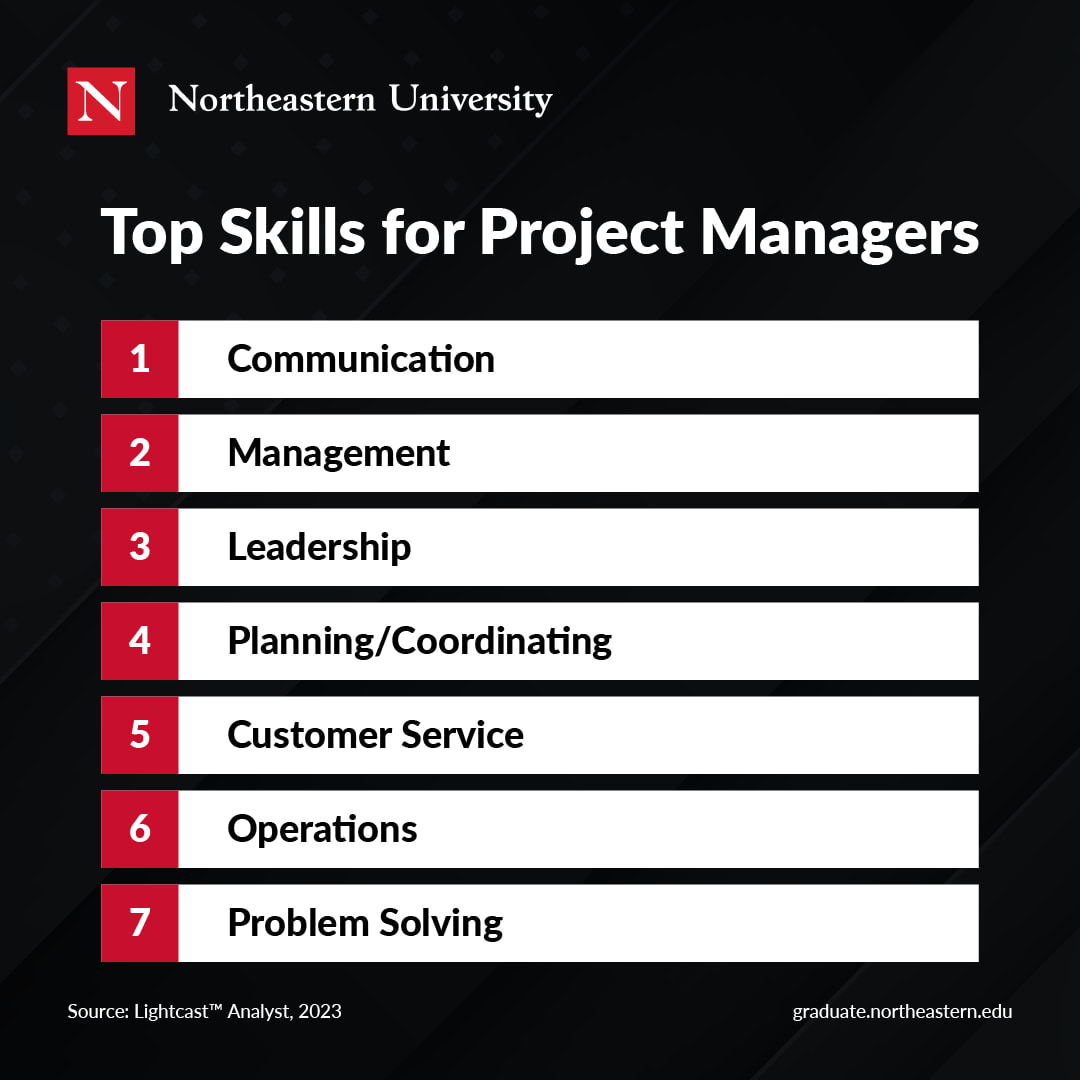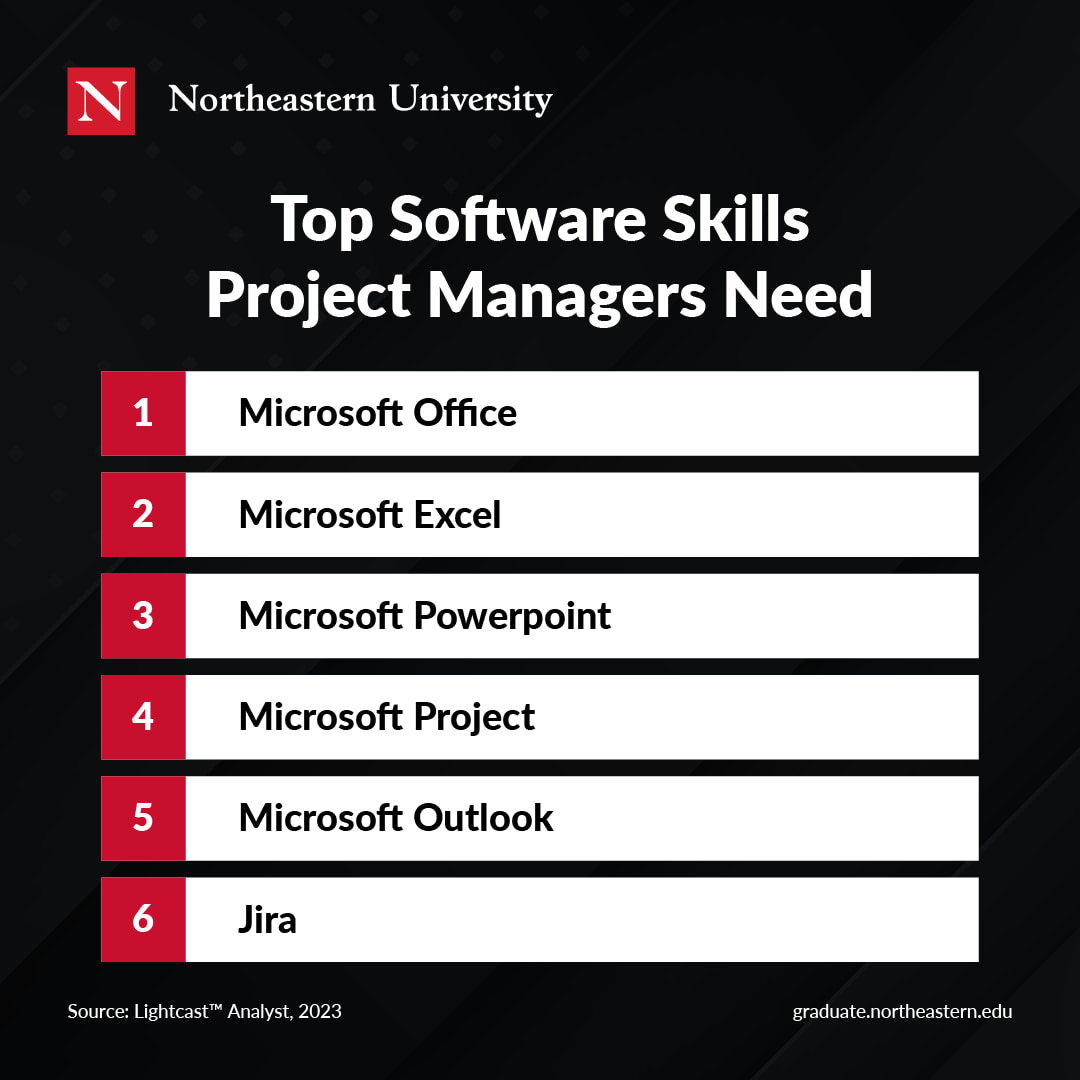As companies strive to deliver complex projects in hyper-competitive environments, the demand for skilled project managers is incredibly high. In fact, according to our analysis of job postings data, the number of project management roles will increase by 11 percent by 2033.

This demand has resulted in continuous salary increases, with project managers earning an average salary of $95,700, increasing at an annual rate of 16.2 percent since 2013.

Despite this demand, however, organizations are facing talent shortages that leave them at significant risk. As such, career opportunities are abundant for project management professionals who possess the key skills these organizations need. Research shows that demand is highest for practitioners with the necessary mix of competencies—a combination of technical and leadership skills plus business acumen.
Are you ready to meet the demand? Read on to discover the seven essential project management skills you need to succeed, and learn how to refine these skills to stand out among the competition.
Download Our Free Guide to Advancing Your Project Management Career
Learn what you need to know, from in-demand skills to the industry’s growing job opportunities.
7 Essential Project Management Skills
Project managers need a wide range of competencies to successfully carry out their tasks. While specific responsibilities vary based on industry and job title, our analysis of job postings data shows that the top skills required across industries include:
- Communication
- Management
- Leadership
- Planning/Coordinating
- Customer Service
- Operations
- Problem-solving
Here’s an overview of each skill and its importance.

1. Communication
From project kick-offs to stakeholder meetings, project managers are constantly communicating. In fact, according to Cesar Abeid, host of the Project Management for the Masses Podcast, project managers spend a whopping 90 percent of their time communicating in some way. As such, project managers must have excellent communication skills in order to successfully lead projects to completion.
Poor communication, on the other hand, can lead to inefficiency and missed deadlines; according to a recent survey, 28 percent of employees report poor communication as the primary cause of failing to deliver a project on time.
In order to mitigate the risk of this, project managers should prioritize learning how to communicate effectively. This includes knowing how to approach people, create meaningful relationships with co-workers, and articulate a clearly established vision of what you wish to achieve.
PMs who can “speak the language” of their organization’s subject matter experts will be able to communicate more effectively with their teams and have a better understanding of a project’s inherent risks and potential roadblocks. Taking the time to think about what you want to say—and how you want to say it—prior to communicating is a simple and productive first step toward honing this skill set.
Did You Know: Most companies regard communication skills as extremely important, regardless of department or industry. In fact, 77 percent of employers say that “soft skills” like this are just as important as technical skills.
2. Management
Project managers need effective management skills. Even if they haven’t had previous experience managing a team, they’re responsible for guiding their team throughout the lifecycle of a project.
Many times, this requires familiarity with several project management tools and software, meaning project managers need intermediate technical expertise to effectively manage projects. These types of programs are frequently used to plan, organize, and communicate with teammates while simultaneously managing resources, budgets, and schedules.
Today, this means project managers must also constantly evolve, learning how to leverage the newest technologies available to successfully lead a project to completion.
According to our analysis of job postings data, the most common software skills project managers need include:
- Microsoft Office
- Microsoft Excel
- Microsoft PowerPoint
- Microsoft Project
- Microsoft Outlook
- Jira

Read More: Project Management | Job Growth and Talent Gap Report
Risk management, which involves identifying and planning for potential risks, is another critical management competency. The most productive project managers are able to identify risks at the outset of a project and develop proper mitigation plans.
Since risks are, by definition, uncertain events, it’s easy for project managers to ignore them and assume they’ll never happen. But by knowing what positive or negative events may impact a project, managers can plan ahead to avoid major problems that could derail a project.
3. Leadership
When managing a team or project, it’s crucial to have strong leadership skills. By effectively coaching, guiding, and motivating your co-workers, you can help move a project forward and deliver a positive outcome. Strong leaders also foster a productive work environment by communicating regularly with their teams and helping their employees develop important project management skills themselves.
Teams also work more efficiently when employees feel they are making a meaningful contribution to the project. You can help team members feel impactful by learning how to delegate tasks, provide constructive feedback, set goals, and evaluate individual and team performance. Be sure to recognize the achievements of your team members so they know you value their contributions, as well. Combining these elements with your own unique leadership style will help you to successfully manage projects while also becoming a more effective leader.
Leading a project also means constantly being involved in negotiations. An effective project manager is often a skillful negotiator with the ability to keep involved parties content and working toward a unified goal at all times.
Unavoidable discussions about budgets, scope creep, resources, and timelines can easily become adversarial if not handled tactfully, and savvy project managers instinctively know when—and how—to apply persuasive techniques that’ll encourage solutions and avoid damaging workplace relationships.
Depending on the situation at hand, project managers may choose to apply different negotiation styles, and it’s important they have the ability to choose which will be the most effective in each given scenario.
The following are examples of negotiation styles:
- Compromise: An agreement with the opposing party is reached
- Collaboration: A win-win solution is reached
- Competition: A project is controlling in a win-lose situation
No matter what style, knowing how to effectively navigate these negotiation tactics is a vital tool for successful project managers.
4. Planning/Coordinating
Planning is a key component of project management. The most common causes of project failure involve poor planning, along with:
- Changing priorities within an organization (40 percent)
- Inaccurate requirements (38 percent)
- Changes in project objectives (35 percent)
- Undefined project goals (30 percent)
Naturally, scheduling is a core responsibility of project managers. However, if you’re adept at juggling multiple schedules and can anticipate roadblocks before they occur, you’ll increase your chances of delivering successful projects.
Chris Bolick, lead faculty for Northeastern’s MS in Project Management, says the first step to effective time management for project managers starts with creating a well-defined project plan. At the fundamental level, a project plan captures business requirements and project scope, while sequencing activities and resources—all of which will go a long way in saving time and money.
5. Customer Service
Customer dissatisfaction is one of the most common constraints project managers face. Even if the project doesn’t involve traditional customers, stakeholders still need to be satisfied in order for the project to ultimately succeed.
“When thinking about customer satisfaction as a constraint, project managers need to keep in mind that simply delivering a project on time, within budget and scope does not mean the customer will be satisfied,” says Bolick.
It’s critical for project managers to be proficient at customer service, and approach each project from the perspective of meeting stakeholders’ needs.
6. Operations
While project managers and operations managers have differing roles and responsibilities, they have several overlapping tasks as well. For this reason, project managers need to be familiar with operations in order for their projects to succeed.
According to Bolick, there are two primary operations-related tasks project managers need to be familiar with:
- Business operations changes: When components of business operations require significant changes, project managers often need to manage these adjustments as projects before delivering them to operations managers
- Closing projects: When a project is closing, project managers will collaborate with operations managers to ensure that there’s a plan for its maintenance and deliverability
7. Problem Solving
While critical thinking and problem solving are skills all professionals could benefit from learning, they’re particularly useful in the project management discipline. Rather than being reactive, the best project managers are proactive and use their critical thinking skills to navigate through tricky or ambiguous projects.
By remaining objective, analyzing the facts, and evaluating options without bias, project managers are able to solve complex problems for organizations while delivering results on time and within budget.
How to Develop Key Project Management Skills
If you haven’t mastered all of these skills, don’t worry. The good news is that these skills can be learned. Here’s how.
1. Practice, Practice, Practice
Like any new competency, these skills take time to learn. If you’re currently in a project management role, be cognizant of utilizing these tools in your day-to-day work. If you haven’t started a career in project management yet, try to seek out opportunities for hands-on learning that’ll allow you to harness and refine them.
2. Attend Industry Events and Workshops
Attending local and online events will allow you to learn best practices and stay abreast of the latest project management trends. For example, at Northeastern, each campus—including both the Boston and regional locations—is partnered with a local Project Management Institute chapter. The university encourages students to get involved with these local chapters, as doing so will give you a chance to expand your professional network to include other skilled project managers from whom you can learn.
3. Get Involved
Always be on the lookout for other opportunities to get involved in the project management community, as well. Consider joining professional associations, which can be another way to meet and exchange knowledge with industry experts. The NUPM, for instance, is a project management student organization on Northeastern’s Boston campus—which will soon be expanding to the Seattle location, as well—and is a great option for Northeastern students looking to get involved.
Advance Your Career by Earning a Degree or Certificate in Project Management
One of the best ways to refine your project management skills is to earn a graduate certificate or degree. Programs like Northeastern’s Master of Science in Project Management provide students with the practical skills and technical expertise needed to lead complex projects to completion.
Not only will you master the above skills (and more), but you’ll also have the chance to obtain hands-on experience through an experiential learning program. Additionally, returning to school will connect you with industry experts from around the globe who can help to advance your career.
For more information on breaking into or advancing your career in project management, download our free guide below.
This article was originally published in July 2017. It has since been updated for accuracy and relevance.







Related Articles
Master’s in Project Management or an MBA: What’s the Difference?
6 Project Management Trends Emerging in 2023
Master’s Degree Comparison: Sports Leadership vs. Sports Management